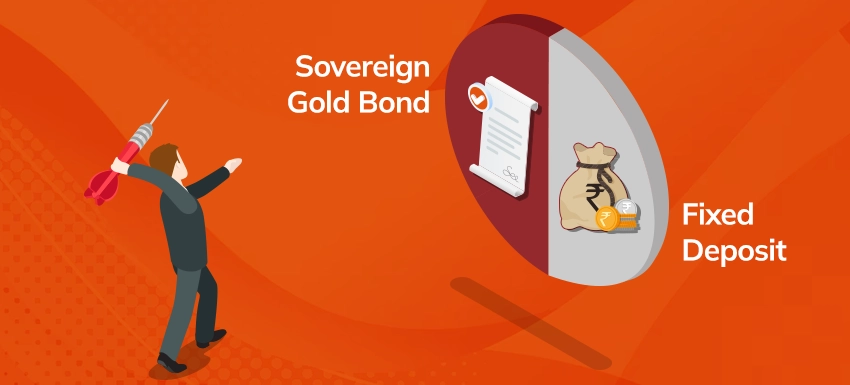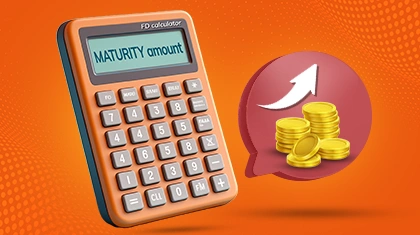THE
ORANGE
HUB
Key Difference Between Sovereign Gold Bond and Fixed Deposit

Sovereign Gold Bonds (SGBs) and Fixed Deposits (FDs) are great investment options for conservative investors. Unlike FDs, which investors have used as a stable, secure option for a long time, SGBs were launched as a Gold Monetisation Scheme by the Government to promote gold investments. This article looks at the differences between SGBs and FDs to help you make the right investment decision.
What are SGBs?
SGBs are financial products issued in the form of certificates by the Reserve Bank of India on behalf of the Government. These certificates are like grams of gold; therefore, investors can own gold without physical possession. Sovereign Gold Bonds are a more secure investment option than physical gold, with a lower chance of price fluctuations. In the long run, the growing popularity and demand for gold may lead to an increase in the price of SGBs, making them highly profitable.
SGBs can be bought in any denomination in the multiple of 1 up to a max of 4 kilograms for an individual in an entire financial year. The maturity period for SGBs is 8 years, with an exit option available from the 5th year onwards. Investing in SGBs provides more diversification and benefits as compared to plain gold. Investors can purchase large nominal denominations and keep them in the bank, earning interest. Buying small nominal denominations may incur storage fees, adding up to the overall cost of investing.
The bonds are issued in tranches within the stipulated periods and the RBI announces this through press releases. The subscription window is open for one week every two to three months. To subscribe to SGBs, investors have to provide their PAN issued by the Income Tax Department through their applications.
What are FDs?
Investors seeking stability and consistent returns invest in FDs. Banks, Non-Banking Financial Companies and Housing Finance Companies issue FDs with a defined maturity period. Fixed Deposits(FDs) provide a fixed interest rate, usually higher than a regular Savings Account, to help maintain regular income flow.
The interest is credited at specific intervals. At the end of the term, the investor has the option to cash in on the principal and interest or to reinvest for continued earnings.
FDs as a form of safe investment with predictable returns may attract penalties for early withdrawal, ultimately affecting the returns. Nevertheless, these instruments are a fundamental part of investment portfolios because of their simplicity, reliability and the capability to adjust to different risk appetites.
Risks involved
Both are low-risk. However, the volatility of gold prices can present a challenge for certain investors, especially over the short-term.
Although the price of gold is volatile over the short-term, in the long run, it trends upwards, acting as a hedge against inflation and currency devaluation. On the contrary, FDs offer stability and predictability since the interest rates remain unchanged during the deposit period.
External factors like changes in the global economy, fluctuations in interest rates or currency values do not influence the funds of the investors in FDs. FDs are a great option for conservative investors seeking reliable income.
Rate of return
Historically, gold investments have offered high yields, normally higher than inflation rates. This asset can be used by investors to protect themselves against uncertain economic conditions. For the past five years, gold has shown outstanding CAGR returns of up to 17.9%, indicating the profitability of investing in gold.
The recent gold price hikes have been a real boon for investors, further boosting returns. However, FDs provide stable returns that are not connected to the market movements. Investors earn guaranteed returns on FDs at the rates previously established by the Bank at the time of opening the account.
Unlike SGBs, which offer fluctuating returns based on gold prices, the return on an FD stays the same during the tenure of the investment. Senior citizens are likely to receive higher interest rates on FDs, which may be 0.50% to 0.75% more than regular investors.
Liquidity
Gold is an influential investment choice because of its liquidity. SGBs offer investors a favourable mode of investing. These bonds do not have physical gold storage problems and one can easily liquidate them. Gold returns are susceptible to global market fluctuations and economic conditions.
It is necessary to follow market trends before investing in or redeeming gold assets. FDs on the other hand, are liquid and have minute penalties, depending on the Terms and Conditions of the investment.
Loan against investment
Investors can get Personal Loans against the value of their FDs, usually borrowing between 80% and 90% of the amount that they have invested. Such services, including Personal Loans with lower rates of interest than the usual rates offered by the majority of Banks, NBFCs and financial institutions are available to the borrowers.
During the lockdown in 2020, gold prices hit an all-time high, leading the RBI to temporarily raise gold’s permissible Loan-To-Value (LTV) ratio to 90%. However, fresh Gold Loans sanctioned on and after Apr 1, 2021 have been attracting an LTV ratio of 75%. This alternative allows individuals to borrow money without selling assets.
Conclusion
SGBs and FDs both provide customers with low-risk alternative investments but operate differently. FDs offer lower returns as compared to SGBs but have the benefit of stability. If you are looking for fixed returns with higher LTV ratios, FDs are your best bet.
Scroll to top














